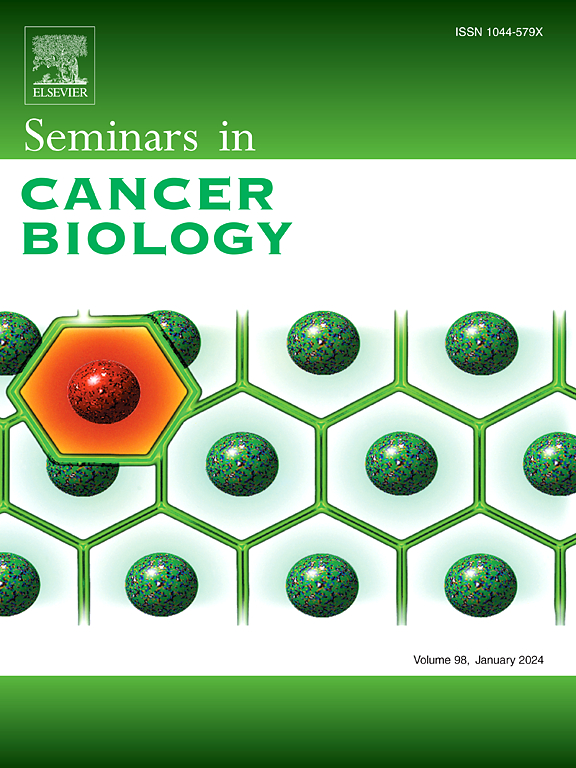通过在没有胰腺癌家族史的健康个体中鉴定BRCA2/ BRCA1致病性变异体来靶向胰腺癌筛查:支持和反对的观点
IF 12.1
1区 医学
Q1 ONCOLOGY
引用次数: 0
摘要
大多数胰腺导管腺癌(PDAC)患者在诊断时不再适合治疗,导致5年生存率低于10% %。无症状个体的成像可以识别早期癌症,但只有错误地将良性病变识别为恶性的风险。对未被选中的人群进行筛查会导致比真正的早期癌症更多的假阳性结果。因此,筛查前的选择是必要的,但很少有高风险人群使筛查更有益而不是适得其反。这些人群包括BRCA2和BRCA1特定突变的携带者,他们有PDAC的家族史。这些致病性突变都具有可预测的影响,使同源重组修复(HRR)在携带者的一生中可能丢失。在这篇综述中,我们将讨论HRR功能丧失对PDAC发展可能性的影响。此外,还将讨论种系致病突变的鉴定是否足以证明对恶性肿瘤发展的携带者进行监测是合理的,或者目前仅筛查近亲诊断为PDAC的携带者的做法是否合理,因为只有一部分携带者处于高风险中。除此之外,审查还将讨论是否有必要更好地定义和划分高风险人群,以便只对高风险携带者进行监视。本文章由计算机程序翻译,如有差异,请以英文原文为准。
Targeting pancreatic cancer screening by identification of pathogenic variants of BRCA2/ BRCA1 in healthy individuals who have no known family history of pancreatic cancer: The arguments for and against.
The majority of patients with pancreatic ductal adenocarcinoma (PDAC) are no longer suitable for treatment with curable intent at the time of diagnosis resulting in a 5-year survival of less than 10 %. Imaging of asymptomatic individuals could identify early cancers, but only with a risk of falsely identifying a benign lesion as malignant. Screening of an unselected population would result in far more such false positives than true early cancers. Selection before screening is therefore essential, but there are very few populations at high enough risk to make screening more beneficial than counterproductive. These populations include carriers of specific mutations in BRCA2, and arguably BRCA1, who have a family history of PDAC. These pathogenic mutations all have a predictable effect in making loss of Homologous Recombination Repair (HRR) likely in a carrier’s lifetime. In this review the impact of such loss of HRR function on the likelihood of PDAC development will be discussed. Furthermore, it will be discussed whether the identification of a germline pathogenic mutation is sufficient to justify carrier surveillance for the development of the malignancy, or whether the current practice of screening only those carriers with a close relative diagnosed with PDAC is justifiable, as only a proportion of carriers are at high risk. The review will go beyond this to discuss whether there is an essential need to better define and stratify those at high risk, so that only high-risk carriers are put on surveillance.
求助全文
通过发布文献求助,成功后即可免费获取论文全文。
去求助
来源期刊

Seminars in cancer biology
医学-肿瘤学
CiteScore
26.80
自引率
4.10%
发文量
347
审稿时长
15.1 weeks
期刊介绍:
Seminars in Cancer Biology (YSCBI) is a specialized review journal that focuses on the field of molecular oncology. Its primary objective is to keep scientists up-to-date with the latest developments in this field.
The journal adopts a thematic approach, dedicating each issue to an important topic of interest to cancer biologists. These topics cover a range of research areas, including the underlying genetic and molecular causes of cellular transformation and cancer, as well as the molecular basis of potential therapies.
To ensure the highest quality and expertise, every issue is supervised by a guest editor or editors who are internationally recognized experts in the respective field. Each issue features approximately eight to twelve authoritative invited reviews that cover various aspects of the chosen subject area.
The ultimate goal of each issue of YSCBI is to offer a cohesive, easily comprehensible, and engaging overview of the selected topic. The journal strives to provide scientists with a coordinated and lively examination of the latest developments in the field of molecular oncology.
 求助内容:
求助内容: 应助结果提醒方式:
应助结果提醒方式:


